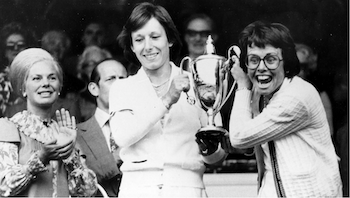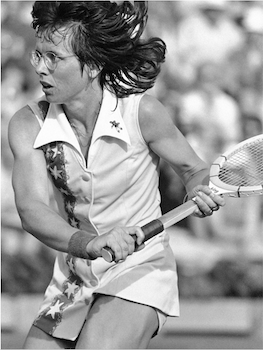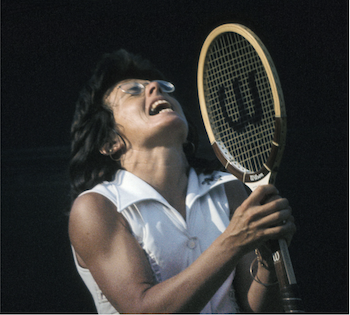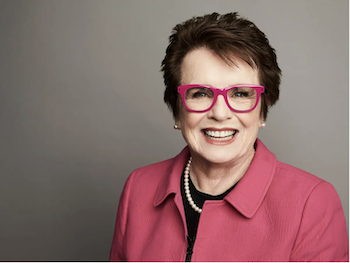
Born on November 22, 1943 in Long Beach, California, Billie Jean King grew up in a conservative Methodist family. Her father, a firefighter, and mother, a dedicated homemaker, instilled strong religious values in their daughter, prompting her to initially aspire to become a preacher in her community. However, at the age of 11, after years of playing basketball and softball, she discovered her passion for tennis.
Her love for the sport sparked when, after being denied the chance to join a group photo for wearing shorts instead of a dress, she realized the urgent need for reform in the tennis world. Armed with a prized racket that she earned through side jobs for her parents and neighbors, King quickly made her mark in local leagues and state championships while attending Long Beach Polytechnic High School.
In 1961, her talent earned her international acclaim at the prestigious Wimbledon Tournament in London, where she and her doubles partner, Karen Hantze Susman, made history as the youngest pair ever to win the title, a record that still stands today.

Between 1961 and 1964, Billie Jean King majored in Physical Education at California State University, Los Angeles, where she was confronted once again with the inequalities faced by talented female tennis players. Despite her skills, she was denied a scholarship, leading her to leave the university without a degree. During this time, she met her future husband, lawyer Larry King, whom she married a year later.
From 1966 to 1975, King dominated women’s tennis, holding the world #1 ranking for six years and consistently remaining in the top ten for an impressive 17 years. Over the next decade and a half, she made history by winning Wimbledon a record 20 times, alongside 13 U.S. championships, four French Open titles, and two Australian Open crowns. In 1972, she triumphed at the U.S. Open in New York, where she unjustly received $15,000 less than the male winner, Roland Garros. That same year, she achieved the remarkable feat of securing three Grand Slam titles at Wimbledon.
King emerged as a trailblazer in the open era of tennis, where amateur players like her were allowed to compete against professionals. She made headlines when she became the first woman and tennis player ever to be named Sports Illustrated’s Sportsperson of the Year.
As the first female athlete to earn over $100,000 in a single season, King took a stand against the tennis establishment in 1973, leading the Women’s Tennis Association union. A fierce advocate for equal pay, she openly criticized the shamateurism of the pre-open era, which involved classifying professional athletes as amateurs while secretly receiving financial support from sponsors and clubs. Thanks to King and her contemporaries’ efforts, the U.S. Open became the first Grand Slam tournament to award equal prizes to male and female players.

Perhaps her most iconic moment came during the “Battle of the Sexes,” where she faced off against Bobby Riggs, an elitist and self-proclaimed male chauvinist. King’s decisive victory in that historic match not only solidified her legacy but also brought significant attention to the fight for gender equality in sports.
The following year, Billie Jean King and Larry King founded the Women’s Sports Foundation, dedicated to creating sports opportunities for young girls, and launched World TeamTennis, the first mixed-gender professional sports league. Although they remained on friendly terms, King and Larry divorced in 1987 after she was outed as a lesbian due to her secret romantic relationship with another woman.
During the early 1970s, King felt compelled to hide her sexuality, fearing the backlash of losing endorsement deals due to the pervasive homophobia of the time and her parents' strict religious beliefs. Amidst this struggle, she fell deeply in love with her doubles partner, Ilana Kloss, and the two eventually married in 2018. It wasn’t until she was 51 that King found the courage to come out to her mother.
After retiring from competition in 1983, Billie Jean King continued to make significant contributions to the world of sports and beyond. She coached the U.S. Fed Cup team, leading them to two victories, and played a pivotal role in the success of the U.S. Women’s Olympic Tennis team, which won gold medals in both 1969 and 2000. In 1990, Life magazine named her one of the “100 Most Important Americans of the 20th Century,” and in 2009, she was awarded the Presidential Medal of Freedom by Barack Obama for her tireless work in the women’s rights and LGBTQ+ movements, once again setting a precedent as a trailblazer.

In addition to founding the Billie Jean King WTT Charities Foundation in 1998, King expanded her advocacy by serving as a director for both the Elton John AIDS Foundation and the National AIDS Fund. In 2014, she and her partner, Ilana Kloss, established the Billie Jean King Leadership Initiative to combat discrimination based on sex, gender, and race in the workplace.
In recognition of her impact, the USTA National Tennis Center—home of the U.S. Open—was named in her honor, and ESPN created the Billie Jean King Youth Leadership Award to celebrate young athletes who positively influence their communities through sports. Indeed, while her achievements as a tennis star are remarkable, they are merely the foundation of her broader mission.
Having dedicated her life to the values of opportunity, equality, and empowerment, Billie Jean King now resides in Chicago with her partner, continuing her advocacy and inspiring future generations to create a more equitable society.
Why Did I Choose to Research Billie Jean King?
As an avid tennis player, I often turn to my female coach for mentorship and motivation. Recently, I shared my involvement in women empowerment movements in my community and asked her about her biggest inspiration in the tennis world. Given her advocacy for girls in South Florida and her role within the United States Professional Tennis Association (USPTA), I knew her answer would be impactful. Without hesitation, she spoke passionately about Billie Jean King and her groundbreaking accomplishments both nationally and internationally.
Just as King inspired my coach and many young women, she has also become a powerful role model in my own life. Her story exemplifies the truth that with determination and effort, meaningful change is not just possible—it’s achievable.
Works Cited
Billie Jean King. (n.d.). Women's Sports Foundation. Retrieved November 5, 2022, from https://www.womenssportsfoundation.org/athlete/billie-jean-king/
Brandman, M. (2021, June). Billie Jean King. National Women's History Museum. Retrieved November 5, 2022, from https://www.womenshistory.org/education-resources/biographies/billie-jean-king
Erskine, J. (2013, August 1). Billie Jean King | Billie Jean King Biography | American Masters. PBS. Retrieved November 5, 2022, from https://www.pbs.org/wnet/americanmasters/billie-jean-king-filmmaker-essay-on-billie-jean-king/2714/
King, B. J. (n.d.). Greatest Female Tennis Players of All Time. Billie Jean King. Retrieved November 5, 2022, from https://www.billiejeanking.com/tennis/
Life Story: Billie Jean King - Women & the American Story. (n.d.). Women & the American Story. Retrieved November 5, 2022, from https://wams.nyhistory.org/growth-and-turmoil/feminism-and-the-backlash/billie-jean-king/
This article was published on 8/14/24